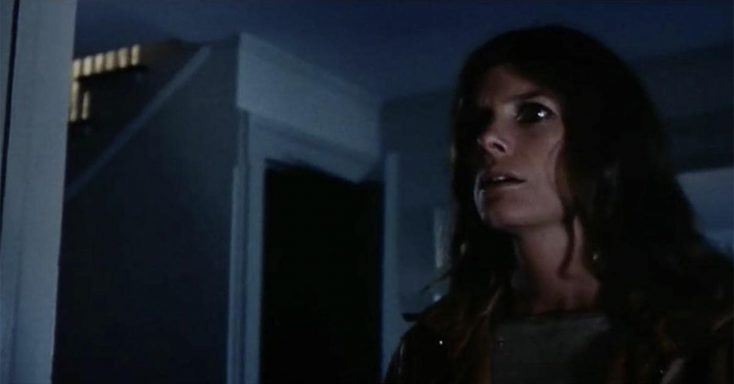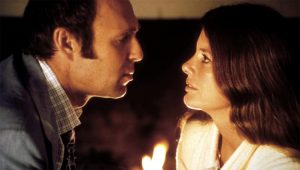By JUDY SLOANE
Front Row Features
HOLLYWOOD-Based on Ira Levin’s best-selling Science Fiction novel, “The Stepford
Wives” spotlights the sinister Men’s Association, replacing their wives with identical-looking mindless robots, and in 1975 it created a feminist uproar. The movie premiered at the height of the Women’s Liberation movement and the film, from its initial screening, was surrounded by controversy and debate.
Katharine Ross portrays Joanna Eberhart, who along with her husband Walter (Peter Masterson) and two young daughters move from Manhattan to Stepford, Connecticut. She befriends Bobby Markowe (Paula Prentiss) and they attempt to organize a women’s liberation group after meeting some of the females in Stepford who seem to want nothing more than to clean their houses and service
their husbands. When Joanna’s husband joins the ominous Men’s Association, and Bobby overnight turns into the perfect housewife, Joanna knows she must grabbed her two daughters and escape from
Stepford.
In 1996, I spoke with director Bryan Forbes (who unfortunately passed on in 2013) and the film’s star Katharine Ross about the making of the provocative motion picture.
Judy Sloane: Bryan, what did you think when you first read the screenplay?
Bryan Forbes: There was a basis of a very good film there. There were aspects which I didn’t think worked, nor did Edgar Scherick (the producer of the movie) and a lot of the actors and actresses that we submitted it to. Finally, Scherick said, “You’d better rewrite the script yourself.” When you’re directing a film, if you don’t believe in it, you can hardly ask actors to. I was an actor for 20 years, I understand as much as any director what goes through an actor’s mind; it’s bloody lonely out there in front of the cameras. And they’ve got to feel that you are with them and that what you’re asking them to do is something you believe in.
Sloane: How hard was it to cast the lead role of Joanna?
Forbes: It proved very difficult to cast for various reasons. There were actresses that were seriously considered – Susan Sarandon, Diane Keaton, Tuesday Weld and Joanne Woodward. We actually cast Tuesday Weld and costumed her and she was ready to shoot. Then she didn’t pass her medical exam and we couldn’t get her insured. She went into her medical and told them she suffered from severe migraines and had to lie in a darkened room for two days. (The role) is meant to work 52 days out of 58. I suddenly thought of Katharine Ross because, like millions of other people, I fell in love with her in “Butch Cassidy and the Sundance Kid.” I met her and thought she was enchanting and cast her.
Sloane: Katharine, what did you think of the role when Bryan approached you?
Katharine Ross: It seemed like there was an awful lot there. It was a more interesting part than I’d been playing since “Butch Cassidy,” and I was intrigued by the clever idea of the story that these men were redoing these women. I flew to New York to meet with Bryan, and then came home and threw things together to go to Connecticut.
Sloane: Were you aware that Tuesday Weld had been given the
role first?
Ross (she laughs): I’d totally forgotten that she was set originally to do the part. So obviously I went in blissfully unaware, which is maybe the best way when you’re doing something like that.
Sloane: What was Bryan like as a director?
Katharine Ross: Some men are intimidated by women and they are too soft, and I don’t think that is Bryan at all. He likes women, maybe because his wife (Nanette Newman) was an actress. He had an opinion and knew what he wanted, which is always a good step for a director.
Sloane: There’s the famous scene where you stab Paula Prentiss’ character in the stomach with a kitchen knife – what do you remember about shooting it?
Ross: They had made this Styrofoam torso because you see a close-up shot of my sticking the knife in her stomach. But there’s something very personal and awful about a knife. It was hard
for me.
Sloane: Bryan, I read you in fact were the one who plunged the knife into the torso for Katharine. Is that true?
Forbes: It’s my hand that sticks the knife into Paula (he laughs). Katharine just couldn’t do it. She found it too disturbing. It’s a very tricky shot to do, because it’s all in one. I won’t give away trade secrets, but in fact there is no cut away, you cut from the knife up to her face. It took quite a lot of strength to drive the knife in, and she found it so horrendous to do that I put her jacket on, shaved the
back of my hand and did it.
Sloane: I read that Katharine also had problems dealing with the scene where she sees the robot of herself for the first time.
Forbes: Katharine didn’t like shooting that sequence at all. It was nasty for her. She was in tears and said, “I’ll be happy when today’s over.” She had to have some extraordinary things put over her eyes which could only be in for 20 seconds at a time, and then she had to have drops put in.
Ross: They were made by a doctor and they were those hard contact lenses that cover the entire eye, and I would just weep because they made my eyes tear even though they were molded and fitted. We’d have to stop while I got mopped up and start again. They didn’t want my eyes to look shiny; they wanted them to look like empty holes.
Sloane: Were you happy with the way the movie turned out?
Ross: It’s always a collaboration when you’re working in a movie, and I really think the choice we all made about the ending was wrong. Joanna chases around and tries to find out what’s going on, and then when it’s finally confronted she gives up rather than fighting it tooth and nail to the bitter end. We talked about that and it seemed like the thing to do then, but I don’t think it was. I don’t usually regret my decisions, but I really feel that it was not the best choice.
Judy Sloane: Bryan, what do you remember about the first screenings in New York?
Forbes: I remember there were a couple of really rabid feminists at the press showing, one of whom hit me with an umbrella. She said, “You chauvinistic pig!” I told her that if she actually looked at it, it wasn’t a chauvinistic picture because the men were such idiots. It was against the men. It was the period when women were all burning their bras, just when feminism was coming to the fore. I certainly didn’t set out to make a film that was anti-women. I thought it was anti-men.






